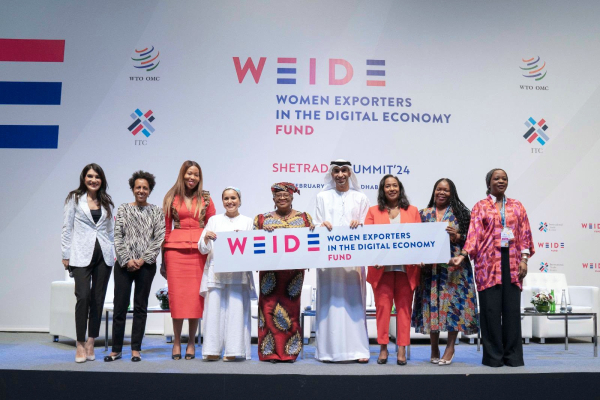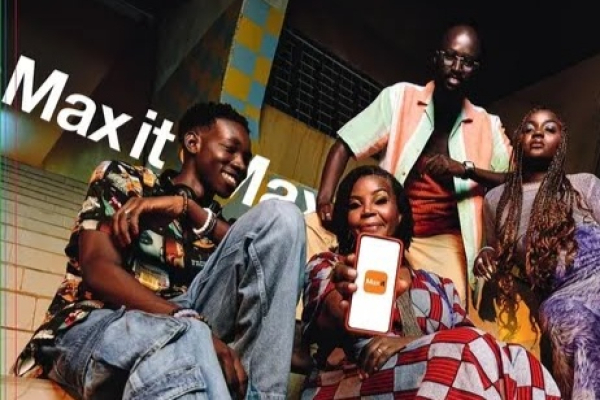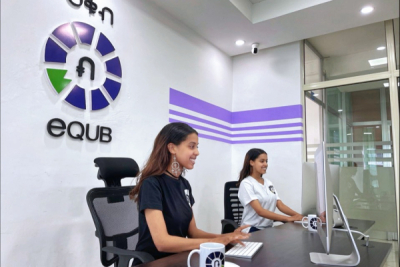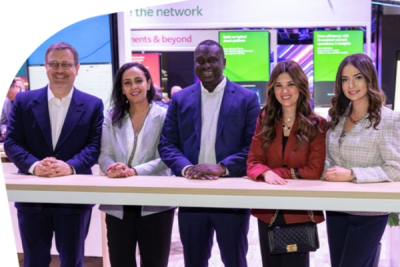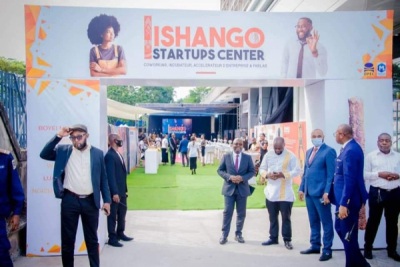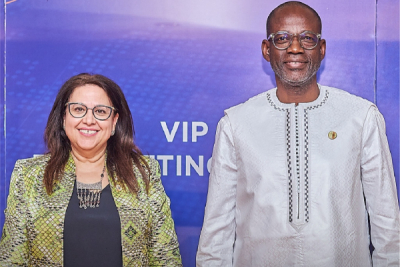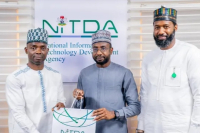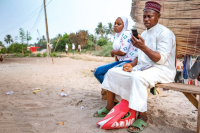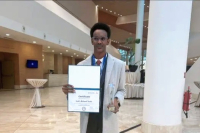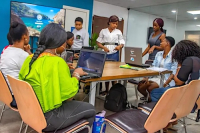In Africa, most women entrepreneurs struggle to obtain financing. Women-owned businesses often lack the capital needed for startup or expansion due to various obstacles.
The World Trade Organization (WTO) and the International Trade Centre (ITC) jointly initiated a $50 million fund, named the Women Exporters in the Digital Economy Fund (WEIDE), on February 25, Sunday. The fund is designed to promote digital technology adoption among women entrepreneurs, not only in Africa but also in other developing and least-developed nations. Its ultimate aim is to enable women to leverage the opportunities presented by international trade and the digital economy.
For Pamela Coke-Hamilton, ITC's Executive Director, the fund will help women to raise the capital they need for their businesses. "Time and time again, women in developing countries tell us that access to finance is a key barrier to trade. With this new Fund, women entrepreneurs will have the resources they need to do business across borders and online," she stated.
In Africa, women entrepreneurs often struggle to access bank loans and capital due to social norms, discriminatory policies, and a lack of collateral. This fund, initially backed by a $5 million contribution from the United Arab Emirates, aims to overcome these challenges.
The fund’s launch is a step towards empowering women in commerce and assisting them in developing and promoting their online businesses. According to WTO Director-General Ngozi Okonjo-Iweala, digital trade, particularly trade in digitally delivered services, has been the fastest-growing segment of international trade since 2005, with an average growth rate of 8%.
"Digitalization presents us with unprecedented opportunities to empower women entrepreneurs, level the playing field, and foster inclusive growth," said Ngozi Okonjo-Iweala.
Samira Njoya
The strategic partnership was inspired by Tencent's Weixin/WeChat ecosystem and its billion monthly active users.
Orange wants to double the adoption of its Max it super-app by 2025. To this end, the French group decided to sign a partnership with China's Tencent Cloud on Tuesday, February 27 at the Mobile World Congress in Barcelona, Spain.
Orange will leverage "Tencent Cloud's Mobility framework and the Tencent Cloud Mini Program Platform (TCMPP) solution to create an open platform for Max it, enabling the integration of a wide range of mini-apps within its super-app." The aim is to enrich the Max it ecosystem and enhance the customer and partner experience for businesses and people in Africa and the Middle East.
Commenting on the partnership, Jérôme Hénique, CEO of Orange Middle East and Africa, said: "This partnership with Tencent Cloud is a key step in our vision to offer innovative and high value-added services to our users. Enriching Max it with innovative mini-apps is key to strengthening its value proposition, increasing its penetration among Orange and non-Orange customers, and amplifying our social impact."
Max it, launched last November, is a super mobile application that aggregates all the services offered by Orange and its partners. The French company aims to position its super-app in this part of the world as a hub for all mobile services. Deployed in half a dozen countries at launch, it will expand to eight more destinations in the first quarter of this year, before covering all the countries where the group operates before the end of the year.
Adoni Conrad Quenum
eQub is an Amharic term for a rotating savings and credit association (ROSCA). Members of an eQub pool their savings, which are then distributed to each member in a predetermined sequence.
eQub, an Ethiopian fintech startup, has developed a solution that allows users to collectivize savings via its mobile application. The startup, headquartered in Addis Ababa, was established in 2020 by Alexander Hizikias. This week, eQub claimed victory at the Fintech Pitch-off competition at 4YFN 2024, held during the Mobile World Congress in Barcelona, Spain.
“Equb is an alternative means to achieve saving and improve access to credit by rotation of savings. Individuals agree to pool their savings for a defined period to jointly save by creating an eQub,” it explains.
Currently available only on Android (with an iOS version under development), it enables users to register by providing personal details, and verifying if they have a bank account and a mobile phone to access the platform. After that step, users then join an existing savings group or one established by the startup.
Users also have the option to create their group but this requires the provision of additional information such as address and biometric national card. The user can set the conditions for joining their group and launch the eQub at a suitable time. The number of rounds in the tontine is dependent on the number of participants.
eQub awards points to participants, which can be used to qualify for deferred payment services and other financial services it plans to introduce soon. According to Nahom Michael, eQub’s business development manager, the solution has attracted over 25,000 users and has formed over 200 savings groups since its inception. The fintech startup generates revenue when tontine winners withdraw funds from the platform.
Adoni Conrad Quenum
The Mobile World Congress opened in Barcelona, Spain, on Monday, February 26, offering an opportunity for technology companies to sign strategic partnerships to support their growth in various regions of the world.
Orange Middle East and Africa and Microsoft signed a Memorandum of Understanding to support digital transformation initiatives in 17 African and Middle Eastern countries. The memorandum was announced, Wednesday, at the Mobile World Congress in Barcelona, Spain.
"This collaboration with Microsoft is a significant step in our commitment to support the digital transformation of African businesses. By combining our network and Microsoft’s solutions, we can provide SMEs with the tools and guidance they need to thrive in the digital economy," said Jérôme Hénique (pictured, left), CEO of Orange Middle East and Africa.
Under that agreement, Microsoft will leverage the Orange network to offer Microsoft solutions such as Microsoft 365, Copilot, Azure, and Dynamics 365 to approximately 15,000 SMEs in 2024 and ultimately to 1 million. The two companies will collaborate on training, marketing, and sales support programs, and establish a steering committee to track progress using performance indicators.
Microsoft, like Orange, continues to invest in the continent. Besides announcing the construction of a new data center in South Africa earlier this month, Microsoft has partnered with several African countries to drive digital transformation. This includes Kenya, where the company will integrate its cloud solutions into public administration e-services, and Nigeria, where it aims to enhance the digital skills of civil servants across various ministries in collaboration with a local partner.
Adoni Conrad Quenum
Ishango Startups Center stands as a beacon, guiding young talents toward entrepreneurial success. It aims to stimulate economic development and promote innovation in the DRC.
Ishango Startups Center, a startup incubator based in the Democratic Republic of Congo (DRC), is a product of a public-private partnership between Medialab Group and its host country’s SME promotion agency OPEC. Launched in 2021, the initiative aligns with President Félix-Antoine Tshisekedi’s vision to enhance the business environment and foster entrepreneurship in the DRC.
The center’s mission is twofold, according to project coordinator Félix Mangwangu. “Firstly, we aim to educate young people from the incubation stage, transforming their projects into formal businesses or startups within the Congolese market. Secondly, we provide ongoing support to these individuals across Africa via an acceleration program.”
Ishango Startups Center is designed to address unemployment issues and cater to the specific needs of the professional sector. It provides both private and open workspaces equipped with high-speed internet and computers. Additionally, the center houses a fablab where entrepreneurs can create 3D models of prototypes relevant to their industries.
To successfully carry out its missions, Ishango Startups Center collaborates with other institutions, including Orange Digital Center (ODC) for additional startup support. In 2023, the center participated in ODC's Orange Fab acceleration program in the DRC. Supported startups include Inki, which provides digital customer feedback solutions, and STAR UP KOBIKA NA NDAKU. The latter develops neonatal incubators with phototherapy, solar power, and health software to reduce infant mortality.
Melchior Koba
Africa needs a skilled workforce to effectively achieve its digital transformation. It can count on the World Bank and its partners, committed to supporting its endeavors.
The Smart Africa Digital Academy (SADA) has received a $20 million grant from the World Bank to expand its activities across Africa, as part of the West Africa Regional Digital Integration Program (WARDIP).
The World Bank funding will support a project that expands upon the existing foundations of SADA and the AReg4DT program. It will train a new generation of African policymakers and regulators, equipping them to utilize the potential of green and inclusive digital transformation through innovative approaches to policy and regulation.
"With this aim, the scale-up will reach 30,000 unique policymakers and decision-makers from all African countries, with a targeted participation level of females at 40%. Given the World Bank’s commitment to digital transformation in Africa, the grant will significantly contribute to regional integration and rapid adoption of the Single Digital Market for Africa," says the Smart Africa press release.
This grant builds upon previous World Bank and SADA collaborations aimed at building digital capabilities in Africa. In November 2023, for instance, the World Bank announced $266.5 million in funding for similar purposes and also for internet access expansion and a single West African digital market.
Initially launched by the Smart Africa Alliance with funding of around $30,000, SADA has already made remarkable progress. Since August 2020, it has offered online training for decision-makers and policy-makers, helping to improve digital skills and promote a dynamic learning ecosystem across Africa.
Samira Njoya
Nigeria Launches Ambitious Digital Literacy Program for 40 Million SMEs.
Digitalization is crucial for SMEs as it enhances efficiency, reduces operational costs, expands market reach, and fosters innovation. By adopting digital tools and platforms, SMEs can streamline processes, improve customer engagement, and access valuable data insights, leading to increased productivity and competitiveness.
The National Information Technology Development Agency (NITDA) and the Small and Medium Enterprises Development Agency (SMEDAN) have introduced an initiative focused on enhancing digital literacy among over 40 million Small and Medium Enterprises (SMEs) nationwide. NITDA disclosed the meeting via a post on the social media platform X (formerly Twitter) on February 23rd.
This strategic collaboration seeks to safeguard approximately 70 million jobs and amplify SMEs’ substantial contribution, constituting a formidable 50% of Nigeria’s Gross Domestic Product (GDP).
Beyond mere partnership, the NITDA-SMEDAN alliance reveals an ambitious action plan to establish a comprehensive database crucial for SMEs’ future growth and sustainability. Kashifu Inuwa, Director-General of NITDA, and Charles Odii, Director-General of SMEDAN, envision a multifaceted strategy that not only prioritizes infrastructural advancements but also places significant emphasis on digital literacy.
Acknowledging the transformative potential of digital tools and platforms in reshaping operational paradigms, NITDA and SMEDAN align with the National Digital Literacy Framework (NDLF). Their shared vision heralds an era where digital competence fuels innovation and propels growth within the SME sector. The imminent Memorandum of Understanding (MoU) is poised to solidify these collaborative efforts, providing SMEs representing a staggering 90% of Nigeria’s workforce and business landscape with a robust foundation for prosperity.
As Nigeria embarks on this transformative journey, the NITDA-SMEDAN partnership emerges as a beacon of hope for millions of SMEs, intrinsically linked to the nation’s economic stability. Given the pivotal role SMEs play in Nigeria’s GDP, the success of this initiative holds the promise of a resilient and prosperous future.
Hikmatu Bilali
Recognizing digital inclusion as a critical factor in economic growth, education, and healthcare access, organizations are working to expand internet access and promote digital literacy in Africa.
The UK’s Foreign Commonwealth and Development Office (FCDO) and the International Society of Mobile Operators (GSMA) announced a new phase of their partnership on Monday, February 27, at the Mobile World Congress (MWC) in Barcelona. The strategic partnership, valued at £37.3 million ($47.3 million), aims to accelerate digital innovation and address barriers to digital inclusion in low- and middle-income countries, including Africa.
Max Cuvellier, Head of Mobile for Development at the GSMA, expressed gratitude for the FCDO’s leadership and ongoing collaboration. “The renewal of this partnership is a tremendous opportunity to continue leveraging our respective strengths to accelerate the impact of transformative digital innovation and tackle local socio-economic challenges and climate change. We are extremely thankful for the FCDO's thoughtful leadership and longstanding collaboration,” he said.
The partnership, which has been in operation for over a decade, has already benefited over 100 million people by creating jobs and enhancing opportunities. The new phase aims to extend its reach to an additional 110 million people, including 60 million women.
The joint “Mobile for Development” program focuses on accelerating the digital and green transition for all, with a particular emphasis on supporting emerging technologies such as AI. In Africa, the program aims to overcome obstacles that hinder countries, businesses, and citizens from fully harnessing the power of digital technologies, including challenges related to mobile Internet adoption such as affordability and digital skills.
According to the GSMA, the number of unique subscribers in sub-Saharan Africa continues to grow. By 2022, the region is expected to have almost 287 million mobile Internet subscribers. Over the next six years, the total number of subscribers could reach nearly 700 million, representing a mobile penetration rate of 50%, thanks to various ongoing projects in the continent.
Samira Njoya
A computer scientist and entrepreneur, he aims to become a key player in the development of the Chadian tech ecosystem. With years of freelance experience across various digital projects, he is now dedicating his expertise to empowering the youth in his country.
Mahamat Issaka Saleh (photo), a web and mobile developer and entrepreneur from Chad, is the founder of Sahelindev. This startup, through its namesake platform, offers IT services, supports tech-related projects, and provides digital skills training for young people.
“There is a shortage of qualified and fast-acting IT service providers in Chad, especially for website creation,” says Saleh explaining that this observation led him to establish Sahelindev, with the primary mission of meeting digital needs and promoting digital technology across Africa.
In an interview with We Are Tech Africa, Saleh expressed his long-term goals of expanding his platform across Africa to foster wider digital transformation. His aim is “ to expand the platform on a continental scale, targeting various African countries to foster broader digital transformation and play a key role in supporting startups by offering innovation spaces and incubation programs." He also wants to "actively participate in social responsibility initiatives by using technology to solve social problems.”
Saleh, who has a deep passion for technology, is driven by his desire to contribute to Chad’s technological progress and create innovative solutions. His journey in the digital world began in secondary school. After earning his high school diploma, he enrolled at M’Hamed Bougara University in Boumerdes, Algeria, in 2018, where he obtained a bachelor’s degree in mathematics and computer science.
Upon graduation, Saleh embarked on a freelance career, offering his skills on various freelancing platforms and providing services to his network and local organizations. His portfolio includes several projects in programming, web and mobile development, and graphic design.
In December 2023, he received the Actor for African Ecosystem ASC award in the “Technology” category at the African Start-up Conference in Algiers.
Melchior Koba
To help African women seize opportunities in the technology industry, She Code Africa will be implementing a training program in product development and management. The FedEx-funded program aims to reach 100,000 women by 2030.
She Code Africa, a program dedicated to empowering African women in technology, has announced a partnership with FedEx to launch a tech training initiative. The program is open to women from all African countries who are passionate about technology and are between the ages of 18 and 45.
The program offers two training paths. The first is a 2-3 month engineering pathway that covers a range of essential technical courses, including software engineering (web and mobile), cloud engineering, data science and analytics, and hardware engineering such as robotics. The second track offers comprehensive 2-3 month bootcamps designed to equip African women with the knowledge and skills needed to design and manage products.
Funded by FedEx, the program also provides career mentoring, a one-month paid internship for practical experience, and job opportunities with leading tech companies. The initiative aims to enable African women to leverage the opportunities offered by the tech industry. By 2030, the program aims to train and integrate 100,000 women and girls into the tech industry. Applications are open until March 8.
Vanessa Ngono Atangana
More...
The Somali government inaugurated the Data Protection Authority on Saturday, February 24, in a ceremony led by the country's Minister of Communications and Technology, Jama Hassan Khalif. The initiative aims to safeguard citizen privacy amid rapid daigital transformation.
Agricultural producers frequently face challenges in marketing their products. A new digital solution addresses this issue by directly linking them with potential buyers, streamlining the sales process.
Senegalese agritech startup, mLouma, has developed a digital marketplace that provides agricultural producers and suppliers with direct access to their customers via a web and mobile platform. The company, founded in 2012 by Aboubacar Sidy Sonko, is based in Dakar.
The application, available exclusively on Android, allows users to create either a producer or customer account. To do so, users need to provide the necessary information and complete the registration process. Customers can make purchases directly on the application or web platform, which features a variety of online boutiques selling local products.
To streamline payments, mLouma has integrated several mobile money payment systems. Also, for delivery, it has partnered with Senegalese startup Yobante Express. mLouma also features a USSD code service, designed to enable those without internet access to learn about products and prices, and to list products for sale on the mLouma platform. “This service was developed to enable people without internet access to inquire about products and prices, and to submit products for sale on the mLouma platform. This data will be recorded and displayed on the web platform after validation,” mLouma explains.
Since its launch, the mobile application has been downloaded more than a hundred times, according to Play Store data. In 2013, mLouma won the m-Agri Challenge organized by the World Bank.
Adoni Conrad Quenum
As an artist, he was usually frustrated with how hard it was to book beauty services for music videos. So, he founded TausiApp, a platform designed to provide easy, transparent access to personalized beauty services.
Kenyan tech entrepreneur and artist, Amos Kimani (photo), is the founder and CEO of TausiApp, a platform that connects individuals seeking personalized beauty services with professional beauticians. The app, launched in 2021, is named after the Swahili word for peacock, ‘Tausi’.
TausiApp uses advanced artificial intelligence algorithms to provide personalized recommendations and optimize service matching. The idea for the app was born out of Kimani’s personal experiences while filming music videos, where he found it challenging to book beauty services on set.
“TausiApp identified a gap in the market for convenient and on-demand beauty services, especially for freelance beauticians who faced challenges in reaching clients efficiently,” Kimani said in February 2024. He also highlighted the plight of salon-employed beauticians who often earn less than 30% commissions, despite being the main attraction for clients.
As of today, TausiApp has served over 20,000 customers, recruited more than 6,000 beauticians, and completed over 13,000 transactions. In early February 2024, Kimani was recognized with the global Underdog Tech Award, a prestigious accolade for technology entrepreneurs.
Kimani, a graduate of Kenyatta University with a Bachelor’s degree in Human Resource Development, also holds a bachelor’s degree in Business Administration and Operations Management from the University of Nairobi. In 2023, he was a finalist in the Start-Up World Cup.
Melchior Koba
Technology is indispensable for investment in Africa. It enhances access to information, streamlines processes, and improves transparency, thereby attracting both local and international investors, showcasing potential, and enabling effective participation in the global economy.
Zimbabwe’s Investment and Development Agency (ZIDA) unveiled, on February 22, its groundbreaking digital Do-It-Yourself (DIY) investment licensing system, signaling the nation’s commitment to fostering a business-friendly climate. The innovative platform streamlines investment processes, enticing both local and international investors.
Tafadzwa Chinamo (pictured), CEO of ZIDA, praised the launch as a pivotal moment, emphasizing Zimbabwe’s determination to facilitate seamless investment procedures. The DIY portal reduces the license approval timeline from seven working days to an impressive two to five days. Investors worldwide can now navigate the licensing process remotely, eliminating geographical barriers.
The automated system integrates with various government ministries and departments, ensuring a harmonized regulatory approach. Busisa Moyo, Chairman of ZIDA, underscored the portal’s strategic significance in positioning Zimbabwe competitively on the global investment stage. With swift access to the nation’s abundant opportunities, investors can explore Zimbabwe’s potential with ease.
Zimbabwe’s transition to digital platforms reflects a broader commitment to modernization and efficiency within its regulatory landscape. By simplifying procedures and enhancing transparency, the government aims to instill investor confidence and catalyze economic growth.
Martin Rushwaya, Chief Secretary to President Emmerson Mnangagwa, reaffirmed the government’s resolve to dismantle bureaucratic obstacles and bolster investor protection mechanisms. ZIDA’s digital leap represents a crucial stride toward realizing Zimbabwe’s vision of economic transformation. The nation stands poised to become a beacon of investment opportunity, attracting forward-thinking entrepreneurs and fostering innovation.
The transition to digitalization indicates Zimbabwe's openness to business, and innovation, and its support for entrepreneurship and investment. With this visionary strategy, investors from around the globe can boldly explore the opportunities Zimbabwe offers as the nation advances into the future.
Hikmatu Bilali


